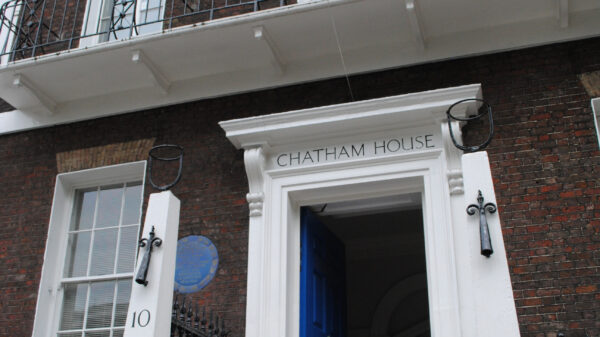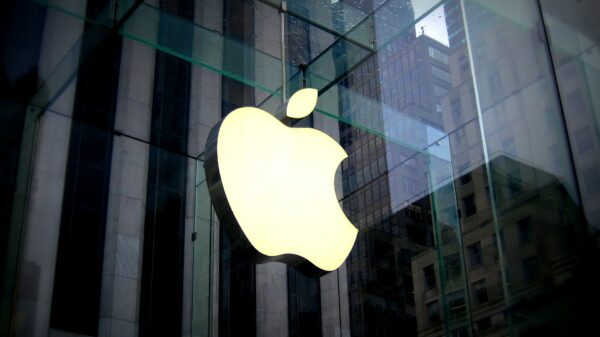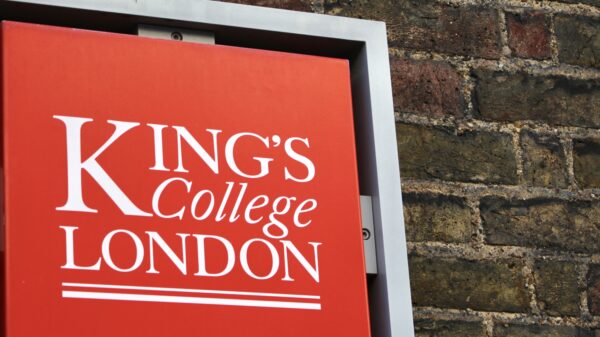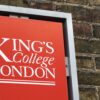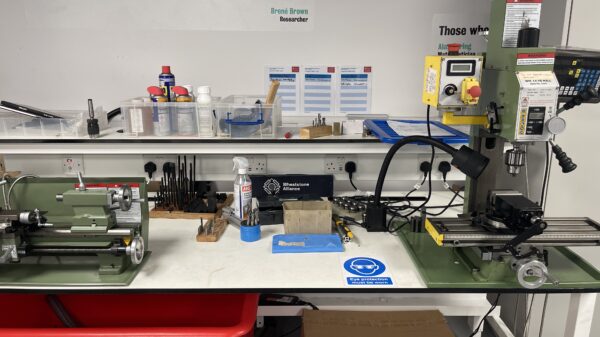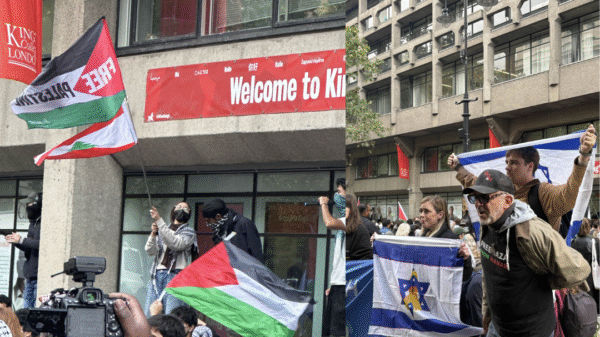King’s College London Students’ Union (KCLSU) is set to hold a referendum on withdrawal from the National Union of Students (NUS) in what would be a historic break with the organisation it helped found.
This article was first published in print on 22 September 2025.
Roar understands that all six sabbatical officers have agreed in principle that KCLSU should leave, citing freedom of expression concerns and wasted funds.
Sources close to KCLSU reveal that plans for a referendum are being drawn up behind the scenes, with a student-wide vote prioritised over a trustee board decision to give either outcome greater legitimacy.
There is a desire to hold the referendum as soon as possible, with King’s students set to be asked to vote on disaffiliation this term, Roar understands.
At King’s, sources close to the sabbatical officers say they have been encouraged by the mood among staff. They reported that SU employees – especially those affiliated with the trade union UNISON – made clear their own disgruntlement with the NUS.
In his manifesto, KCLSU President Baiyu Liu stated he would endorse the campaign for calling a referendum on leaving the NUS.
If KCL students voted to withdraw, it would mark a significant defeat for the NUS, with KCLSU becoming the third founding member to leave. Imperial College Union (ICU) voted to disaffiliate from the NUS in 2008, with Birkbeck Students’ Union doing so in 2023.
The plans at King’s come against the backdrop of a national movement. Sabbatical officers across the country have accused the NUS of threatening its own membership after a row over the union’s stance on Gaza escalated into a public feud, alongside the emergence of a new coalition – ‘Not My NUS’ – who are now campaigning for mass withdrawal.
The row started with an open letter on 11 July, addressed to the NUS board of directors. It was signed by more than 180 elected sabbatical officers and student groups from 52 different universities, including KCLSU’s Vice President Education (Health) Hasnain Jafer, and groups such as KCL Stands for Justice.
Emblazoned upon the letterhead is the logo of a new coalition, ‘Not My NUS’, which laid out eight demands of the union, including condemning “Israeli apartheid and occupation”, defending students’ “right to protest against Zionism” and most controversially, to rescind the IHRA definition of antisemitism.
The “non-legally binding working definition of antisemitism” by the International Holocaust Remembrance Alliance is used by UK police forces and the majority of universities. It defines antisemitism as “a certain perception of Jews, which may be expressed as hatred toward Jews.”
IHRA definition of antisemitism
The IHRA concedes that “manifestations might include the targeting of the state of Israel, conceived as a Jewish collectivity”, but are steadfast that “criticism of Israel similar to that levelled against any other country cannot be regarded as antisemitic.”
The campaign argues the definition has been “repeatedly weaponised to silence criticism of Israel on campuses”, pointing to Kenneth Stern, who as the definition’s lead drafter, has spoken out against its misuse to suppress free speech at universities. The Union of Jewish Students (UJS) is an ardent supporter of the definition and previously campaigned for British universities to adopt it.
THE RESPONSE FROM THE NUS
While the NUS did not directly respond to the open letter, in a leaked email seen by Roar, NUS officials wrote directly to student union chief executives, including to KCLSU’s senior leadership team.
The letter stated the Union’s intent “to ‘call in’ as many officers as we can.” Officials said that the NUS welcomed challenges over Gaza only “in a format that does not include or condone antisemitism or harassment”, charges the campaign vehemently denied, highlighting the Jewish signatories of the letter.
The letter rebukes the campaign’s demand to repeal the IHRA definition, and condemns the coalition for failing to acknowledge that the definition has been “unanimously voted for by the Union of Jewish Students,” arguing that “the letter in effect asks NUS to target Jewish individuals and almost all British Jewish organisations.”
The letter added, “Being Jewish means having access to Israeli citizenship and Israeli citizenship means being subject to Israel’s compulsory military conscription policy therefore the relationship between British Jews, Zionism, Israel, and the IDF (Israeli Defense Force) is complex.”
In response, the campaign said: “This argument is not only reductive but engages in behaviour that is antisemitic by any functional definition. It conflates Jewish identity with Israel’s state violence, implying collective responsibility of all Jewish people for the actions of a state.”
In the email, officials also criticised the campaign’s conduct regarding Noah Katz, a board member of NUS UK and NUS Charity. Officials described select social media posts as “overtly antisemitic harassment of a Jewish individual who has nothing to do with the actions of the Israeli government” and said such conduct “may also be unlawful.”
The Union referenced the campaign’s posts, including one of Katz at the Israeli Ministry of Foreign Affairs. In their response, ‘Not My NUS’ said the accusation was “fundamentally flawed in both law and principle”, arguing the campaign had drawn on publicly available material and that highlighting the connections of elected officials was “a lawful exercise of political expression, a matter of public interest, and not harassment.”
The correspondence to SUs provided instructions on how student union executives might raise the matter with the signatories, including to approach the conversation with an “ABI” (Assume Best Intent) attitude and to tell their officers that the NUS was developing a new approach to Israel-Palestine “that they could be a central part of.”
The letter suggested that officers should “admit that they’ve made a mistake (which is ok! we all make mistakes and we’re all learning!)”.
For those who had seen their intervention as a moral response to a humanitarian crisis, being told to simply admit they were in error was seen as cold and patronising. “They just don’t get it”, one campaign leader told Roar.
In the letter, the NUS added: “The actions highlighted in red are required in order to take part in NUS activities and events under our Code of Conduct.” Such actions included officers needing to “withdraw their name from the letter and associated @not.my.nus Instagram account”.
THE CONFERENCE
The Union’s threats to block campaigners from the Lead and Change conference backfired when a group of protesters occupied the University of Birmingham’s Guild of Students building on 28 July, where the NUS event was scheduled to take place.
“We, an autonomous grouping of disenfranchised students, have today entered into occupation inside the building of Guild of Students, University of Birmingham, for the duration of the NUS conference Lead and Change, after the NUS refused to answer our open letter”, the group said in a video posted online.
The conference continued in scaled-back format, with sessions hastily relocated or held virtually. Epitomising the split, NUS organisers relocated a workshop on Palestinian activism, while activists occupied the intended venue in protest of the Union’s Palestine stance.
In a leaked email, the NUS acknowledged the disruption but praised “collectivism in action.” A campaign source described the phrasing as “laughable”, remarking on the Union’s decision not to mention that this particular display of ‘collectivism in action’ was aimed squarely at the NUS itself.

Privately, NUS officials sought to attempt to persuade signatories to withdraw their names.
Reaching out directly to sabbatical officers, NUS leadership made time for bespoke pleas. Campaign sources claim NUS President Amira Campbell personally met with several officers, citing a desire to maintain the relationship with the NUS and convince disaffected members to back down.
According to the sources close to the ‘Not My NUS’, campaigners felt this validated their central argument that the Union had become an institution more concerned with controlling the narrative than championing the views of students across the country.
However, the charges of “antisemitic harassment” and the threat of exclusion have been emotionally bruising for some. One SU president from a London university said: “As a student leader, I’m being forced to choose between attending a national training conference for student officers or standing by my values.” He continued, “I feel a mix of emotions, I am disappointed, hurt and terrified. I feel betrayed and I’ve never felt more alone.”
INSIDE THE CAMPAIGN
Campaign sources told Roar the ‘Not My NUS’ operation is deliberately lean, coordinated by a central committee of fewer than ten sabbatical officers. However, they revealed the campaign has hired operational, media and legal advisers with decades of higher education experience. The recruitment of professionals reflects the coalition’s strategy to develop into a broader political operation aimed at challenging the relevance of the NUS.
The campaign aims to be the voice of not just anger over Gaza, but effectively convey what they see as the Union’s failure in representing and protecting students.
One sabbatical officer spoke positively about individual universities’ efforts to protect groups including commuters, trans students and disabled students. However, campaigners believe that the Union that once lobbied ministers on behalf of students no longer effectively fulfils its primary purpose, partly due to what an insider described as a bloating bureaucracy and stalling reforms.
The campaign publicly stated that “the ousting of Shaima Dallali” was a “turning point”. In 2022, NUS President Shaima Dallali became the first to have been fired in the Union’s history after “significant breaches of NUS policies” related to antisemitism allegations. Last year, she reportedly accepted a “substantial” settlement to end legal action against the Union.
Dallali apologised for a tweet posted years before her election as President, and in a joint statement with the NUS “accepted that while it was not her intention, the tweet was antisemitic.” The NUS also clarified that “pro-Palestinian and anti-Zionist beliefs may be protected beliefs, as may pro-Zionist beliefs. As a private individual Ms Dallali is, and as president of NUS she was, entitled to hold protected beliefs.”
According to reports in The Canary, some signatories are now considering filing discrimination claims against the NUS under the Equality Act, alleging exclusion on the basis of anti-Zionist beliefs.
Officers who were once merely critical now speak openly of withdrawal.
“It started as an organisation making a collective effort to tackle the UK’s challenges”, one ‘Not My NUS’ member said. “Now, they themselves are that challenge.”
The timing could prove fatal for the NUS. As the new academic year begins, some of the most committed disaffiliation advocates across the country are now in positions with the power to trigger referendums.
For an organisation that prided itself on radical student politics, the NUS may now find itself politically outflanked by its own grassroots representatives.
Asked what comes next, a senior organiser was deliberately coded to this paper: “Responses are ready, and the response isn’t just written.”
KCLSU responded to Roar’s request for comment:
“KCLSU exists to support our members in actively shaping their student experience and education. As an inclusive organisation, we uphold the right to free expression, while also expecting our members to engage in dialogue that respects differing views.
“We remain committed to working with NUS and others to tackle any form of discrimination or injustice, and to ensuring that all students can thrive in a safe, respectful, and inclusive environment.”
NUS did not respond to requests for comment.



